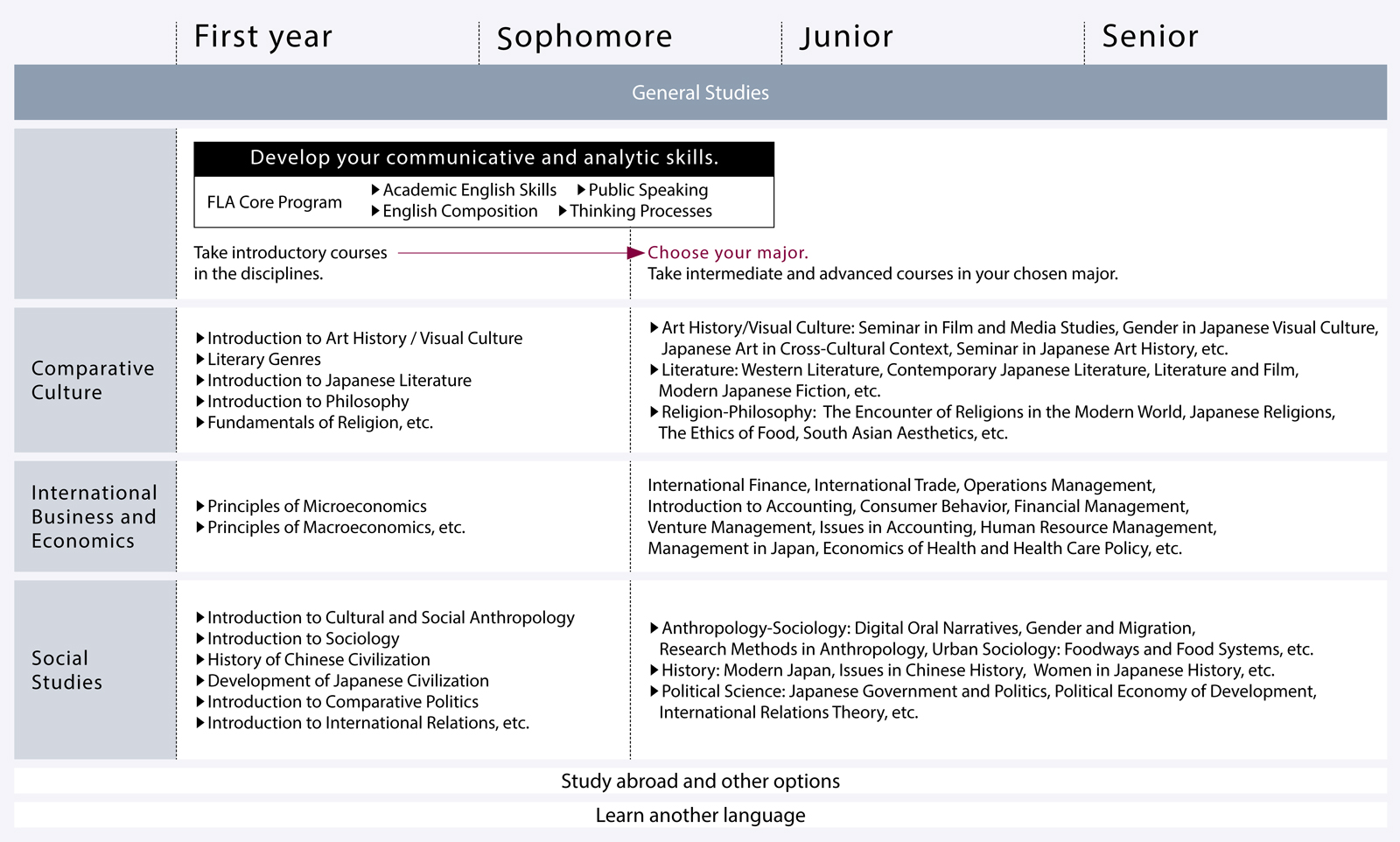Department of Liberal Arts
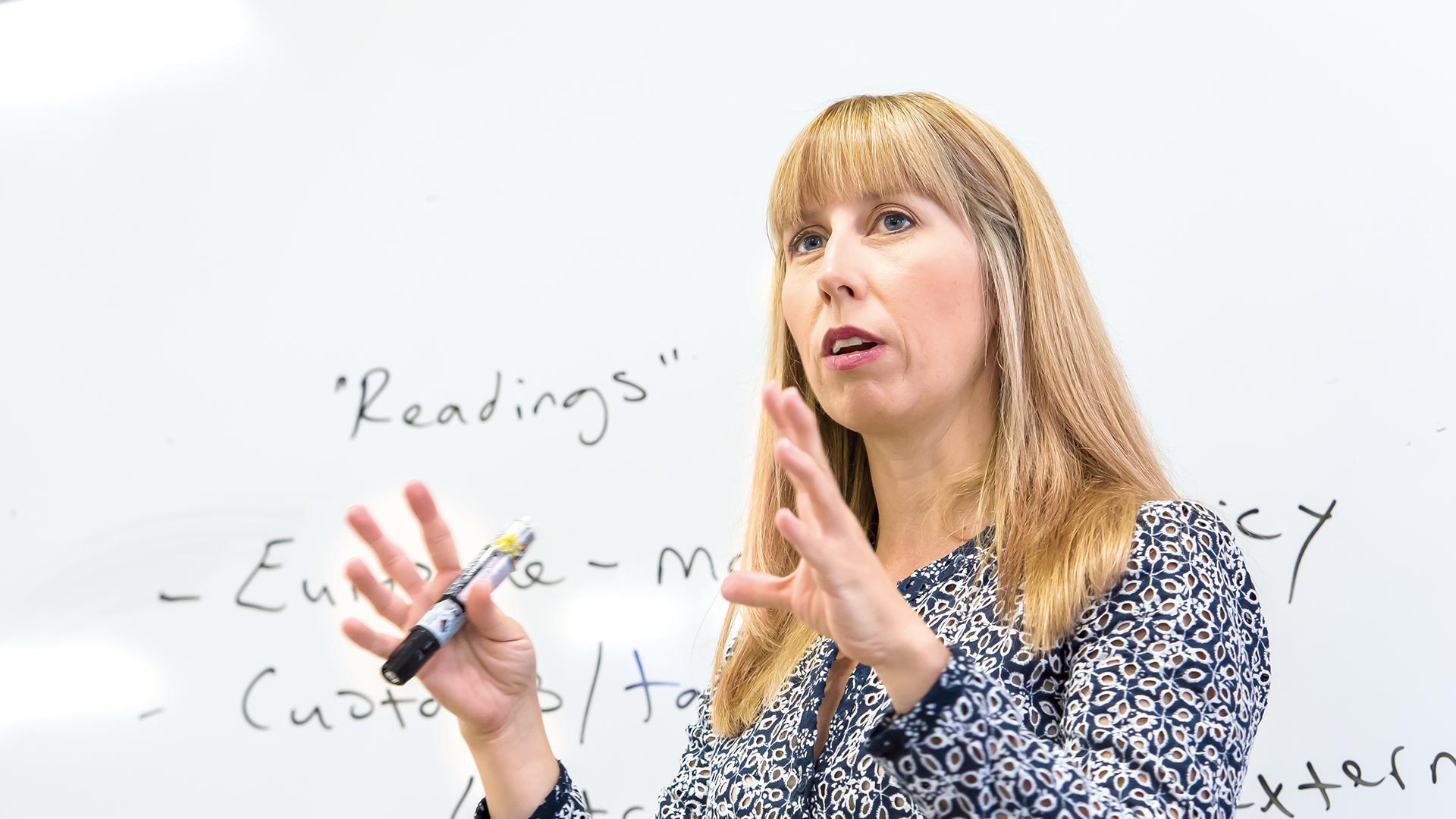

Department Features
The Faculty’s rigorous academic programs are designed to equip students with flexible and critical thinking skills, linguistic abilities, and cultural competencies necessary to navigate today’s increasingly multicultural and complex world, and to take the lead in bridging differences and promoting mutual understanding. Comparatively small class sizes, diversity in the student body, which comprises over fifty nationalities, and highly qualified professors from diverse backgrounds provide an ideal environment for achieving the FLA’s educational mission.
Curriculum
The FLA offers an English-taught liberal arts curriculum which enables students to acquire a strong academic foundation and intellectual orientation before selecting a disciplinary major.
During the first year, students are required to take “core courses” which train them thoroughly in critical thinking skills as well as in writing and public speaking skills. From the second year onward, the FLA curriculum requires students to choose a major from among three broad areas (Comparative Culture, International Business and Economics, and Social Studies), and to study that field in close connection with neighboring disciplines. In the junior and senior years, students take advanced courses in their selected major, while continuing to take courses outside their major. This interdisciplinary orientation is designed to foster students’ ability to approach issues from multiple perspectives.
※ Please see the syllabus at the Sophia University website for details.
Core Program
The FLA Core Program comprises a set of required courses for degree students.These courses include a sequence of composition courses, a public speaking course, and a course in critical thinking. Before the beginning of classes in both the spring and autumn semesters, all incoming students take a placement test to determine where in the sequence of Core Program courses they will begin. Students are expected to complete Core Program requirements during their first and second years of study. The Core Program ser ves several purposes within the FLA curriculum. Besides developing the critical reading, writing, and thinking skills needed at the college level, the Core Program curriculum helps students grasp the expansive and interdisciplinary nature of a liberal arts education and, through a close engagement with a wide range of texts and topics, prepares them for choosing a major field of study. The learning goals and objectives of the Core Program emphasize the development of clear, effective, and critical communication in both speaking and writing, as well as the habits of mind that foster integrative thinking and the ability to transfer knowledge and skills from one setting to another.
Writing Center
The Sophia Writing Center offers writing assistance for all students in the Faculty of Liberal Arts. Whether the student is working on an essay in one of the required courses in the Core Program or a research paper in an advanced course in the student’s chosen major, the tutors at the Writing Center can help. Tutorials can be scheduled from Monday to Friday. These tutorials are generally conducted by graduate students in the Graduate Program in Global Studies and exceptional undergraduate students in the FLA program. Tutorials are given on an individual basis, providing students with an opportunity to examine their ideas and arguments with an accomplished writer. Students can then revise their written work to satisfy the requirements of the assignment. In addition to individual tutorials, the Writing Center offers several workshops each semester, focusing on topics such as principles of academic writing and documenting sources. You will be introduced to the Writing Center at the beginning of your first semester, and its helpful services will be available to you throughout your university career.
General Studies
General Studies (GS) courses allow students to study beyond a specialized area, facilitating interdisciplinary understanding of academic fields and reflection upon fundamental human and social issues. The scope of courses is broad, and in addition to Studies in Christian Humanism, Language, Liberal Arts of the Body, Data Science, offers GS distribution courses in three categories: Society and Culture, Cultural Traditions, and Politics and Economy. Furthermore, the various Elective Courses allow students to acquire a solid foundation in Computer Studies, Environmental Issues, Geography, Mathematics, and Statistics.
Three Majors
1. Comparative Culture
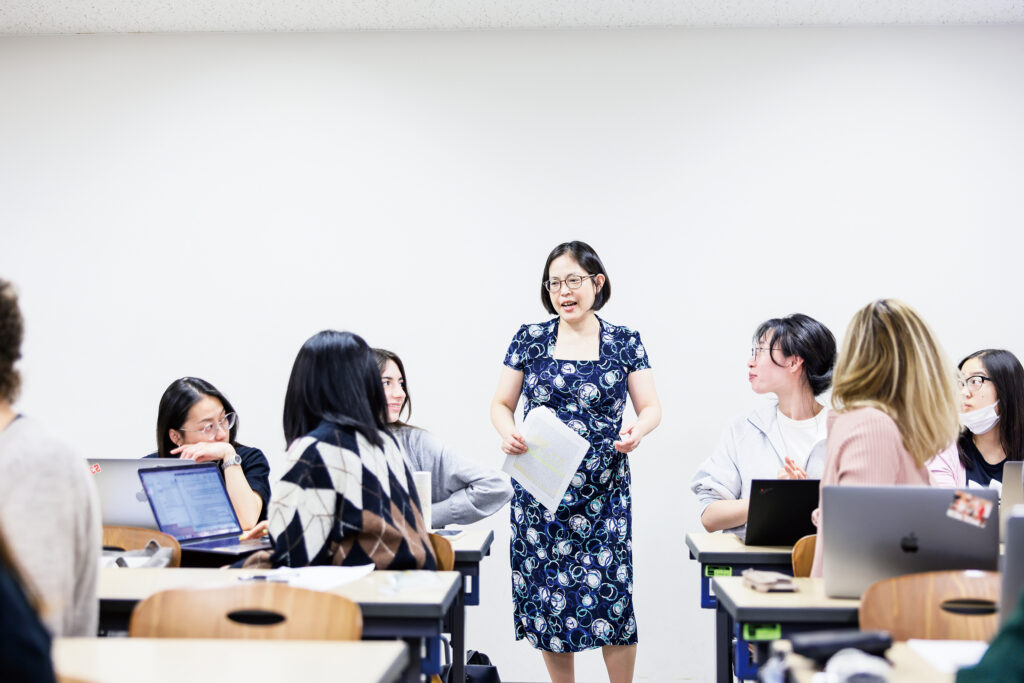
Comparative Culture (CC) is an interdisciplinary major in the humanities focusing on the fields of Art History/Visual Culture, Literature, and Religion and Philosophy. Dealing with a variety of cultural traditions, Art History/Visual Culture covers all fields of art and visual culture, such as architecture, painting, sculpture, photography, film, and mass media. The field of Literature explores the epics, novels, poetry, theatrical works, and other genres produced in a variety of cultures.
Religion and Philosophy focuses on understanding the philosophical and religious orientations of different cultures as expressed in myths, philosophical and religious texts, the arts, rituals, and ethical practices. Many of the courses in the three fields of study share overlapping themes and interests. In particular, all three fields focus on understanding how peoples of different cultural traditions have attempted to understand themselves as well as those of other cultures. In addition, Comparative Culture focuses on developing students’ skills in critical reading and writing as well as in interpreting their own and other cultures. Comparative Culture thus aims to prepare students for a range of career tracks and life situations in an age that is increasingly marked by globalization, the encounter of different cultures, and the emergence of multi-cultural societies and workplaces.
To see course descriptions, please click the link below, which will take you the Syllabus Inquiry page on Loyola.
2. International Business and Economics
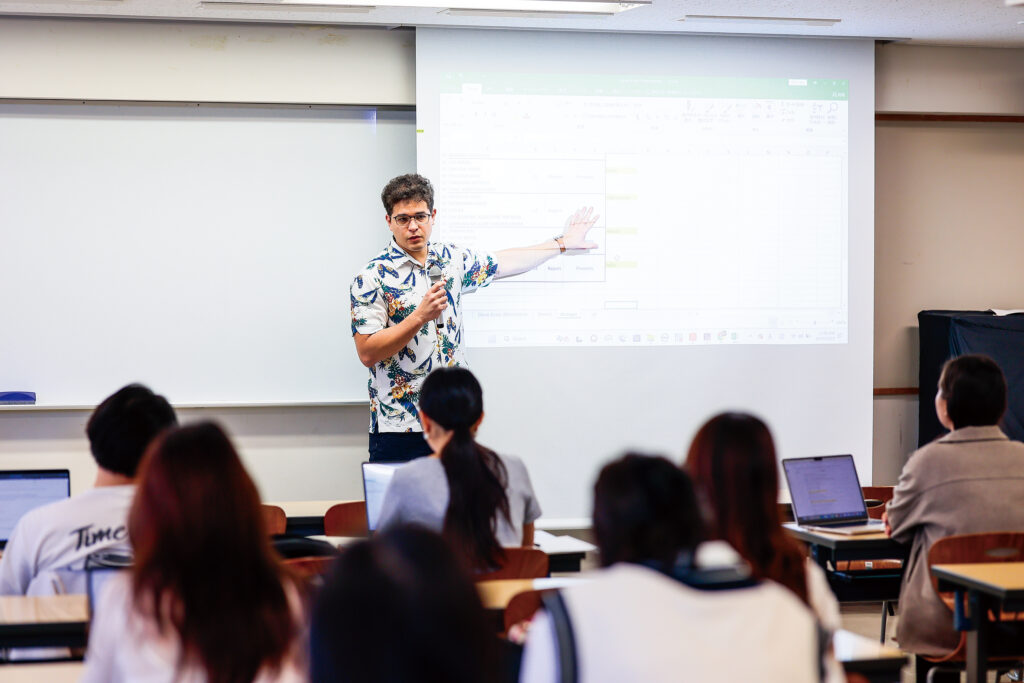
The International Business and Economics (IBE) major offers a unique opportunity for students to study both business and economics in a single major. The IBE program allows students to develop the strong skill sets required for employment in a wide range of fields. Students first build solid foundations by taking fundamental courses in microeconomics, macroeconomics, management, marketing, accounting and statistics and then acquire advanced knowledge and skills in the area of their interest with courses such as internationaltrade, international finance, financial management, industrial organization and consumer behavior.
Class lectures often involve in-class discussions, group assignments, and frequent interactions with students of diverse backgrounds from all over the world. The program thus enables students to experience a fully international, multicultural environment, which in turn allows them to make the smooth transition from college education to the international workplace. In addition, the flexible nature of the FLA program allows students to immerse themselves in classes outside of IBE – such as anthropology and religion – while taking up a foreign language and/or studying in other faculties at Sophia.
To see course descriptions, please click the link below, which will take you the Syllabus Inquiry page on Loyola.
3. Social Studies
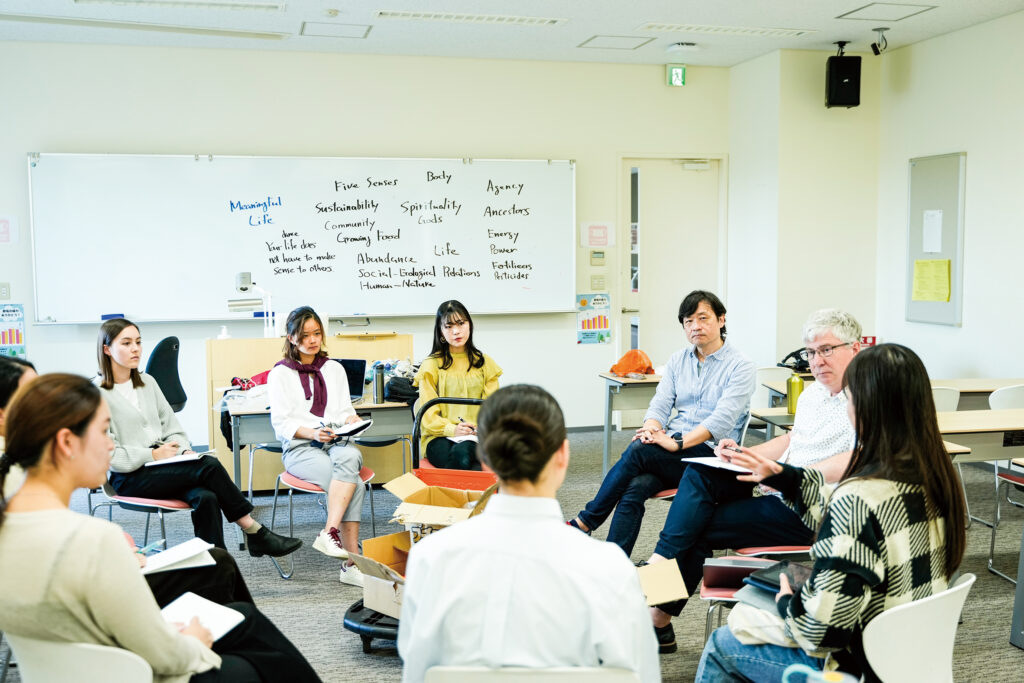
Social Studies is a core component of any liberal arts curriculum. The Social Studies major comprises three concentrations – History, Political Science, and Anthropology-Sociology.
It seeks to give students a deeper understanding of the social, political, and cultural environment in which they live, and to liberate them from being bound to their immediate milieu. Students majoring in Social Studies receive training in a wide range of job-relevant skills, including analytic reading, writing, logical thinking, data gathering, presentation, discussion, and group work.
However, the main purpose of the Social Studies major is not to train students in technical skills. It is rather to encourage students to reflect upon the customs, principles, institutions, and values which inform the societies they live in, and to contribute to their betterment. Students majoring in Social Studies are required to choose a primary field and a secondary field from the three concentrations available within the major. Major courses build systematically, from introductory lectures to advanced, small-sized seminars. The curriculum emphasizes fostering intellectual curiosity, encouraging independent research, and exposure to a variety of perspectives.
To see course descriptions, please click the link below, which will take you the Syllabus Inquiry page on Loyola.
Purpose and Policy of Education
-
The Faculty of Liberal Arts [FLA] provides an all-English liberal arts education in the fields of Comparative Culture, International Business and Economics, and Social Studies. While offering courses in such fields as well as cross-disciplinary courses, so as to allow a more organic, comprehensive understanding in the field, the FLA also aims to help students to achieve advanced language proficiency and intellectual criticality and flexibility in order to act as mediators between different cultures and countries. Through academic training and research, the FLA contributes to the understanding of current affairs in today’s globalized world and also to the solving of the various social issues we face.
-
The purpose of the FLA education is to nurture students’ cosmopolitan outlook, their language ability, and flexibility in thinking in order to act as bridges between different cultures within the context of globalization.
-
The Faculty of Liberal Arts sets standards for the skills and knowledge students should acquire before graduation as described below. Those who have fulfilled the requirements will be awarded a diploma.
- A well-rounded interdisciplinary education and a highly-developed ability to think and communicate in English.
- The intellectual capacity to approach particular issues from both highly specialized and broad general perspectives.
- The capability to integrate themselves in multi-cultural environments and participate in communal activities to contribute to the better understanding of various important socio-cultural issues.
-
In accordance with the Diploma Policy, the Faculty of Liberal Arts constructs its curriculum with courses aligned with the following purposes.
- To develop the ability to think critically about a wide range of social and cultural issues, and to become proficient in discussing such matters in English. The Core Program is specifically designed to train students in these foundational skills.
- To extend their capacity to understand the multiplicity of societies and cultures in the world by taking a range of courses in the three distribution categories: Society and Culture, Cultural Traditions, Politics and Economy.
- To acquire specialized knowledge in one of the three majors (Comparative Culture, International Business and Economics, Social Studies) while continuing to take courses from neighboring areas.By studying courses in various disciplines, students will obtain a broad and flexible perspective on important issues in today’s world.
-
The Faculty of Liberal Arts of Sophia University welcomes students who are:
- Motivated to become active and responsible members of the global community and to participate in the creation of social, economic, and humanistic values essential for its sustenance and betterment.
- Intellectually curious and eager to improve their communication and analytical skills to constructively interact with others from diverse socio-cultural backgrounds.
- Prepared to expand further their knowledge so that they become able to identify and approach with competence global issues.
Faculty Members
Comparative Culture
Edward DROTT Professor
| Research Areas | History of Japanese religion,religion and the body |
|---|---|
| Related Articles |
Shion KONO Professor
| Research Areas | Comparative literature and modern Japanese literature |
|---|---|
| Related Articles |
Noriko MURAI Professor
| Research Areas | Modern art history,visual culture,gender studies |
|---|
Matthew Carl STRECHER Professor
| Research Areas | Modern and contemporary Japanese literature,literary journalism,genre studies,mythology,global literature,postmodernism |
|---|---|
| Related Articles |
Angela YIU Professor
| Research Areas | Modern Japanese literature,literature and Tokyo |
|---|---|
| Related Articles |
Tatsuo MURAKAMI Associate Professor
| Research Areas | Theories of religion (modernity,colonialism,materiality) ,African Pentecostalism |
|---|---|
| Related Articles |
Kiyokazu OKITA Associate Professor
| Research Areas | Hindu studies,classical Sanskrit literature,Sanskrit poetry and poetics,Bengali literature,studies on emotions |
|---|---|
| Related Articles |
Mathew THOMPSON Associate Professor
| Research Areas | Medieval and early modern Japanese literature,particularly the otogizoshi,ko-joruri,gunkimono genres; samurai representation and the legend of Minamoto no Yoshitsune |
|---|
Yen Yi CHAN Assistant Professor
| Research Areas | Premodern Japanese art,Buddhist art,sacred space,memorials and monuments,images of Shakyamuni,relic worship,figural representations and formation of body,cultural exchanges and Buddhist art,visual culture of death,religious sculpture |
|---|
Akiko FRISCHHUT Assistant Professor
| Research Areas | Metaphysics of time,consciousness,philosophy of food,aesthetics |
|---|---|
| Related Articles |
Hannah HOLTZMAN Assistant Professor
| Research Areas | Global cinema,film history,media theory,documentary,digital media,ecocinema,technology studies |
|---|
Maiko KODAKA Assistant Professor
| Research Areas | Visual/Popular Culture,Anthropology of Japan,Gender and Sexuality,Media Studies and Digital Ethnography |
|---|
International Business and Economics
Naoto ISAKA Professor
| Research Areas | Financial markets,corporate finance |
|---|---|
| Related Articles |
Yacob KHOJASTEH Professor
| Research Areas | Operations management,supply chain management,business and management |
|---|
Akihito ASANO Associate Professor
| Research Areas | Applied microeconomic theory,economics education |
|---|
Peter De MAEYER Associate Professor
| Research Areas | Consumer behavior,pricing and advertising |
|---|---|
| Related Articles |
Gabriel Fuentes CORDOBA Associate Professor
| Research Areas | Development economics,applied microeconomics,agricultueral economics,economic systems |
|---|---|
| Related Articles |
Takuya HASEBE Associate Professor
| Research Areas | Labor economics,health economics,econometrics,applied microeconomics |
|---|---|
| Related Articles |
Michiru SAKANE Associate Professor
| Research Areas | Macroeconomics,international finance |
|---|
Junko UENISHI Associate Professor
| Research Areas | Financial accounting,international accounting,comparative accounting systems |
|---|
Forhad HOSSAIN Assistant Professor by Special Appointment
| Research Areas | Entrepreneurship and Innovation,Social Business,Digital Business Strategy,Digital Health,Sustainable Development |
|---|
Social Studies
Tadashi ANNO Professor
| Research Areas | Theories of international relations and comparative politics,globalization and the future of the nation-state,nationalism,Soviet and Post-Soviet politics |
|---|---|
| Related Articles |
Tina BURRETT Professor
| Research Areas | Leadership,democratization,political accountability,the role of the media in politics |
|---|
James FARRER Professor
| Research Areas | Urban sociology,foodways and cuisine,sexuality,nightlife,skilled migration(expatriates) |
|---|---|
| Related Articles |
Bettina GRAMLICH-OKA Professor
| Research Areas | Japanese history,digital humanities,gender studies,material culture |
|---|---|
| Related Articles |
Christian HESS Professor
| Research Areas | Modern Chinese history,urban history,Japanese imperialism and colonialism in China,the regional history of Northeast China,globalization and Chinese cities |
|---|---|
| Related Articles |
Takeshi ITO Professor
| Research Areas | Agrarian and environmental change; ecology,capitalism,the state; power,domination and resistance; Southeast Asia and Japan |
|---|---|
| Related Articles |
Koichi NAKANO Professor
| Research Areas | Japanese politics,comparative politics,New Right transformation,public protest and civic activism,party politics and policy change,bureaucracy and administrative reform |
|---|---|
| Related Articles |
Sven SAALER Professor
| Research Areas | Japanese political history,history of Japanese foreign relations,politics of memory,history of Pan-Asianism |
|---|---|
| Related Articles |
David SLATER Special Contract Professor
| Research Areas | Cultural anthropology,refugees and migrants,urban ethnography,semiotics; Tokyo |
|---|---|
| Related Articles |
Yuka MINAGAWA Associate Professor
| Research Areas | Social demography,health and aging,socio-economic transition from communism in East Central Europe and former Soviet Union |
|---|---|
| Related Articles |
Takehiro WATANABE Associate Professor
| Research Areas | Cultural and social anthropology,modernity,critical theory |
|---|
Dodom KIM Assistant Professor
| Research Areas | Social and cultural anthropology,state and citizenship,law and culture,migration and mobility,media and technology,visual anthropology,Southern China and East Asia |
|---|
Ilju KIM Assistant Professor
| Research Areas | Migration,citizenship and gender,skilled migration (IT industry),immigrant labor market participation,comparative research |
|---|
Core Program
Gary G FOGAL Associate Professor
| Research Areas | Applied linguistics,second language writing development,dynamic systems theory & usage-based linguistics,pedagogical stylistics |
|---|
Chris HARWOOD Associate Professor
| Research Areas | Language and literacies education,sociocultural theory,online pedagogy |
|---|
Dennis KOYAMA Associate Professor
| Research Areas | Applied statistics,collaborative learning,educational assessment,second language writing,task-based language teaching |
|---|---|
| Related Articles |
Hanako OKADA Associate Professor
| Research Areas | Applied linguistics,narrative inquiry,language and identity,sociocognitive approach to language and culture |
|---|---|
| Related Articles |
